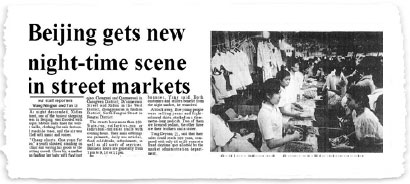This Day, That Year
(China Daily) Updated: 2017-06-15 07:33Item from June 15, 1984, in China Daily: As night descended, Xidan Street, one of the busiest shopping areas in Beijing, was flooded with people. Mobile stalls lined the well-lit walks and clothing for sale festooned roadside trees. ...
Xidan night market has more than 130 stalls and counters open at night. Encouraged by the government, at least nine streets in Beijing have opened such markets since June.
In the past three decades, Xidan district has been developed into one of the capital's must-see shopping areas with several malls and eateries.
But traffic, noise and hygiene problems have led to the closure of some markets.
Last year, Donghuamen Night Market near Xidan, which opened in 1984, was shut down.
Located at the east gate of the Forbidden City and next to Wangfujing Street, the bustling night market was well-known for various foods, including smelly tofu and insect delicacies.
As the first night market in Beijing, it attracted a lot of tourists and was a hit with foreign travelers.
For the past few months, Beijing authorities have been cracking down on illegal structures in several parts of the city, including Sanlitun and Dongsi, in an effort to restore the original appearance of the old narrow alleys known as hutong.
The city calls them an "integral part of the capital's culture".
However, some night markets such as Guijie are still open. It has more than 200 eateries offering a wide variety of cuisine.
The success of such markets has been attributed to good management.

- 'Cooperation is complementary'
- Worldwide manhunt nets 50th fugitive
- China-Japan meet seeks cooperation
- Agency ensuring natural gas supply
- Global manhunt sees China catch its 50th fugitive
- Call for 'Red Boat Spirit' a noble goal, official says
- China 'open to world' of foreign talent
- Free trade studies agreed on as Li meets with Canadian PM Trudeau
- Emojis on austerity rules from top anti-graft authority go viral
- Xi: All aboard internet express











